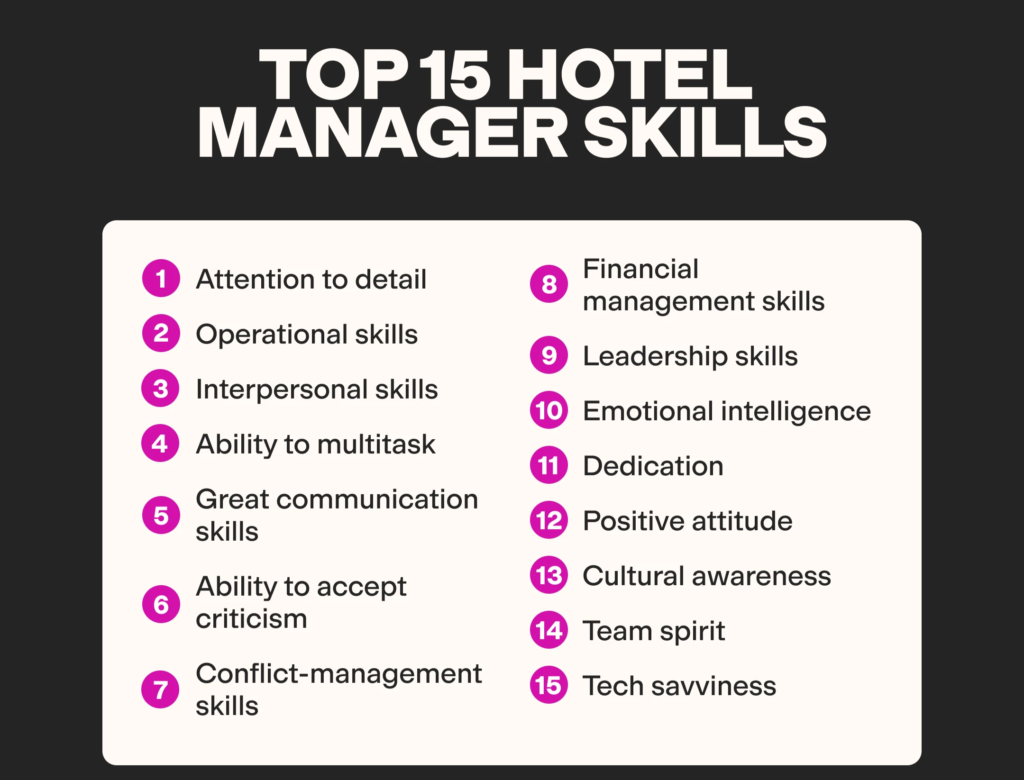Choosing the right career path can be a daunting task, especially in today’s competitive job market. Many individuals find themselves struggling to identify a stable and rewarding profession that aligns with their interests and skills.
For those considering the hospitality industry, the lack of clear information about opportunities and growth prospects in hotel operations can be overwhelming. Moreover, understanding the specific skills and qualifications required to succeed in this dynamic field often adds to the confusion.
- Struggling to find a stable and rewarding career path: Many people are unsure if hotel operations offer long-term stability and growth.
- Lack of clarity about opportunities in the hospitality industry: The vastness of the hospitality sector makes it difficult to pinpoint where hotel operations fit in and how they can lead to fulfilling careers.
- Confusion about required skills for success: Readers may not know which skills are essential for excelling in hotel operations, leaving them uncertain about how to prepare themselves for this career.
If you’re someone who is passionate about building a career in hotel operations but unsure where to start, this blog is your ultimate guide. It provides:
- A comprehensive roadmap to help you understand what a career in hotel operations entails.
- Insights into job roles, responsibilities, and growth opportunities within the hospitality industry.
- A detailed breakdown of the key skills and qualifications needed to thrive in this field, including how additional expertise like digital marketing can enhance your career prospects.
By the end of this blog, you’ll have a clear understanding of how to build a successful career in hotel operations while leveraging additional skills like digital marketing to boost your professional growth. Let’s dive into this exciting journey!
Table of Contents
What is Hotel Operations?
Hotel operations refer to the day-to-day activities and management processes involved in running a hotel or lodging facility. These operations include the coordination, oversight, and execution of all tasks required to ensure that guests have a pleasant and efficient stay. Hotel operations cover everything from guest check-in and room cleaning to managing guest requests, ensuring food and beverage service, and maintaining overall property upkeep.
Importance of Hotel Operations in the Hospitality Industry
Hotel operations are at the core of the hospitality industry because they directly affect the guest experience, revenue generation, and overall brand reputation. Efficient and smooth operations are essential for:
- Guest Satisfaction: The seamless execution of hotel services contributes significantly to guest comfort and satisfaction, which is vital for customer retention and positive reviews.
- Profitability: Well-managed hotel operations can lead to cost efficiencies, better resource utilization, and increased revenue through room bookings, food services, and additional services.
- Brand Reputation: Consistency in hotel operations helps build a strong reputation, encouraging repeat customers and attracting new guests.
- Operational Efficiency: Streamlining operations and improving workflows enhance productivity, reduce waste, and improve the service delivery cycle.
Various Departments in Hotel Operations
Here’s a concise table summarizing the various departments in hotel operations that makes your career in hotel operations :
| Department | Role | Key Functions |
|---|---|---|
| Front Office | Manages guest interactions and reservations. | Check-in/check-out, reservations, guest inquiries, concierge. |
| Housekeeping | Maintains cleanliness and room readiness. | Cleaning rooms, managing laundry, stocking amenities. |
| Food & Beverage (F&B) | Provides food and drink services to guests. | Managing kitchens, serving meals, room service, event catering. |
| Maintenance | Ensures the property and systems are in good condition. | Repairing equipment, maintaining HVAC, plumbing, and safety checks. |
| Sales & Marketing | Promotes the hotel to attract guests. | Marketing campaigns, managing online presence, partnerships. |
| Human Resources (HR) | Manages staff and employee welfare. | Recruiting, training, compliance, employee benefits. |
| Finance | Manages financial operations. | Budgeting, accounting, revenue tracking, financial planning. |
| Security | Ensures safety and security of guests and property. | Monitoring security systems, conducting patrols, emergency plans. |
| Guest Services | Handles special requests and additional services. | Transportation, tours, concierge services, special arrangements. |
- Front Office
- Role: The front office is responsible for guest check-in/check-out, reservations, guest inquiries, and providing a first point of contact for customers.
- Key Functions: Managing room assignments, handling payments, addressing guest complaints, and offering concierge services.
- Housekeeping
- Role: This department is responsible for maintaining the cleanliness and comfort of the hotel.
- Key Functions: Cleaning guest rooms, public areas, managing laundry services, and ensuring that all rooms are properly stocked with necessary amenities.
- Food & Beverage (F&B)
- Role: The F&B department is responsible for providing meals and drinks to guests within the hotel, whether through restaurants, room service, or event catering.
- Key Functions: Managing the kitchen, serving food and drinks, maintaining inventory, and offering dining experiences for guests.
- Maintenance
- Role: Ensuring the hotel’s physical infrastructure is in good condition.
- Key Functions: Conducting regular repairs, maintaining equipment and systems like HVAC, plumbing, and electrical systems, and ensuring the safety of guests by meeting health and safety standards.
- Sales & Marketing
- Role: This department is responsible for promoting the hotel to attract guests.
- Key Functions: Creating marketing campaigns, managing online bookings, promoting special events, and establishing partnerships to boost occupancy rates.
- Human Resources (HR)
- Role: The HR department focuses on managing the hotel’s workforce, ensuring staff are well-trained, motivated, and aligned with company goals.
- Key Functions: Recruiting and training staff, ensuring compliance with labor laws, managing employee benefits, and handling disputes.
- Finance
- Role: This department manages the financial operations of the hotel.
- Key Functions: Handling accounting, managing budgets, tracking revenue and expenses, and ensuring profitability through financial planning and reporting.
- Security
- Role: Responsible for the safety and well-being of the guests and the property.
- Key Functions: Monitoring security systems, conducting regular patrols, and ensuring emergency procedures are in place and followed.
- Guest Services
- Role: Providing additional services and responding to guest needs.
- Key Functions: Arranging transportation, providing tour services, offering concierge recommendations, and assisting with special requests.
Together, these departments collaborate to create a seamless and enjoyable experience for guests, while maintaining operational efficiency and financial stability for the hotel. Effective hotel operations require strong communication, teamwork, and leadership to align all departments toward common goals.
Why Choose a Career in Hotel Operations?
Choosing a career in hotel operations can be a rewarding experience for those who enjoy working with people and have a passion for creating memorable experiences. Here are some of the reasons why you might want to consider this field:
Variety of roles and opportunities: The hotel industry offers a wide range of career paths, from entry-level positions like front desk agents and housekeeping staff to management roles like hotel managers and general managers. There are also opportunities in specialized areas such as food and beverage, sales and marketing, and event planning.
Fast-paced and dynamic environment: Hotels are constantly bustling with activity, providing a dynamic and exciting work environment. Every day brings new challenges and opportunities to interact with people from all over the world.
Opportunities for travel and adventure: Working in the hotel industry can open doors to travel and adventure. You may have the opportunity to work in different locations, experience new cultures, and meet people from all walks of life.
Transferable skills: The skills you develop in hotel operations, such as communication, problem-solving, and teamwork, are highly transferable to other industries. This makes it a valuable career path for those who are looking to build a strong foundation for future career success.
Personal and professional growth: The hotel industry provides ample opportunities for personal and professional growth. You can learn new skills, develop your leadership abilities, and advance your career through training and development programs.
Rewarding work: Helping guests have a positive and memorable experience can be very rewarding. Knowing that you have contributed to someone’s enjoyment and satisfaction can be a great source of pride.
Job security: The hotel industry is a stable and growing industry, providing job security and opportunities for long-term career growth.
If you are looking for a challenging and rewarding career in hotel operations that allows you to work with people, travel the world, and make a difference, then a career in hotel operations may be the perfect fit for you.
Key Skills Needed for Success in Hotel Operations
Success in hotel operations requires a blend of technical expertise, interpersonal abilities, and adaptability. The hospitality industry is fast-paced and customer-centric, so mastering these skills can set you apart and help you thrive in this dynamic field. Here are the essential skills you need to excel:

1. Exceptional Communication Skills
- Clear and effective communication is the backbone of hotel operations.
- Whether interacting with guests, managing staff, or coordinating between departments, strong verbal and written communication ensures smooth operations.
- Non-verbal cues like body language and tone also play a significant role in creating a welcoming environment for guests.
2. Outstanding Customer Service
- Delivering memorable guest experiences is at the heart of hospitality.
- Empathy, patience, and attentiveness are essential to understanding and addressing guest needs promptly.
- Personalized service and the ability to resolve complaints effectively can turn dissatisfied customers into loyal patrons.
3. Problem-Solving and Decision-Making
- The unpredictable nature of hotel operations means challenges can arise at any time—be it a double-booked room or a maintenance issue.
- Quick thinking, creativity, and sound decision-making are critical to resolving problems efficiently while maintaining guest satisfaction.
4. Organizational and Time Management Skills
- Hotels are complex entities requiring meticulous coordination across various departments.
- Strong organizational skills help manage schedules, prioritize tasks, and ensure deadlines are met without compromising service quality.
- Time management ensures smooth daily operations, from check-ins to event planning.
5. Leadership and Teamwork
- Managing a hotel requires collaboration across diverse teams such as housekeeping, front office, food & beverage, and maintenance.
- Strong leadership inspires teams to perform at their best while fostering a positive work environment.
- Teamwork ensures seamless coordination to deliver exceptional guest experiences.
6. Adaptability and Flexibility
- The hospitality industry is ever-changing, with new trends, technologies, and unexpected situations arising frequently.
- Adaptability allows professionals to embrace change, take on different roles when needed, and stay ahead of industry developments.
7. Attention to Detail
- Small details can make or break a guest’s experience—whether it’s ensuring spotless rooms or remembering specific guest preferences.
- A keen eye for detail helps maintain high service standards that set your hotel apart from competitors.
8. Technological Proficiency
- Familiarity with hotel management software (e.g., reservation systems), point-of-sale systems, and digital communication platforms is increasingly important in modern hotel operations.
- Technology streamlines processes, enhances efficiency, and improves the overall guest experience.
9. Cultural Awareness
- Hotels cater to guests from diverse cultural backgrounds, making cultural sensitivity an essential skill.
- Understanding different customs and preferences ensures all guests feel respected and valued during their stay.
10. Financial Acumen
- Understanding budgeting, revenue management, and cost control is crucial for running profitable hotel operations.
- Financial skills enable managers to make informed decisions that balance guest satisfaction with business success.
By mastering these skills, you can build a strong foundation for a successful career in hotel operations while ensuring exceptional guest experiences and operational excellence!
Career Opportunities in Hotel Operations
Hotel operations offer a wide range of career opportunities, from entry-level roles to senior management positions. Each role comes with its own responsibilities, growth potential, and salary packages. Below is an interactive and engaging breakdown of these opportunities, including salary ranges and placement statistics.
1. Entry-Level Roles
These positions are perfect for fresh graduates or individuals starting their careers in hotel operations. They focus on learning the basics of hospitality and customer service.
- Examples:
- Front Desk Officer
- Housekeeping Staff
- Event Coordinator
- Responsibilities:
- Handling guest check-ins and check-outs (Front Desk).
- Maintaining cleanliness and hygiene (Housekeeping).
- Assisting in planning and executing events (Event Coordinator).
- Salary Packages: ₹2–5 LPA
- Placement Statistics: ~77%
2. Mid-Level Positions
After gaining a few years of experience, professionals can move into managerial roles where they oversee teams and handle more responsibilities.
- Examples:
- Department Manager
- Food & Beverage Manager
- Event Manager
- Responsibilities:
- Managing specific hotel departments like housekeeping or food services.
- Ensuring smooth operations and guest satisfaction.
- Coordinating with various teams to deliver high-quality service.
- Salary Packages: ₹6–12 LPA
- Placement Statistics: ~85–90%
3. Senior Roles
These are leadership positions that require extensive experience and expertise in hotel operations. Professionals at this level are responsible for the overall management of the hotel.
- Examples:
- General Manager
- Director of Operations
- Responsibilities:
- Overseeing all hotel departments to ensure smooth functioning.
- Strategic planning to enhance revenue and guest experiences.
- Managing budgets, compliance, and staff performance.
- Salary Packages: ₹15–50 LPA (depending on the brand and location).
- Placement Statistics: ~90–100%
Salary Packages & Placement Overview Table
| Role | Salary Package (INR) | Placement Statistics |
|---|---|---|
| Front Desk Officer | ₹2.5–4 LPA | 77% |
| Housekeeping Staff | ₹2–3.5 LPA | 77% |
| Event Coordinator | ₹3–5 LPA | 77% |
| Department Manager | ₹6–12 LPA | 85–90% |
| General Manager | ₹15–25 LPA | 90–95% |
| Director of Operations | ₹20–50 LPA | 95–100% |
Why Choose Career in Hotel Operations?
Career in Hotel operations not only offer diverse career paths but also provide excellent growth potential, competitive salaries, and global exposure. With placement rates as high as 95–100% for senior roles, the industry ensures stability and professional development.
By starting in entry-level roles, gaining experience, and developing key skills like leadership, communication, and problem-solving, you can climb the ladder to senior management positions with lucrative pay packages.
Whether you’re just beginning your career or aiming for senior leadership roles, hotel operations provide a fulfilling pathway with immense opportunities for learning and growth!
Conclusion
A career in hotel operations is more than just a job—it’s a journey filled with opportunities to grow, learn, and make an impact. From entry-level roles that introduce you to the fundamentals of hospitality to senior management positions that allow you to lead and innovate, hotel operations offer a fulfilling career path with immense growth potential.
The industry’s global reach, dynamic work environment, and lucrative salary packages make it an attractive choice for anyone passionate about delivering exceptional guest experiences.
To succeed in this field, it’s essential to equip yourself with the right skills and education. Whether it’s mastering customer service, developing leadership abilities, or gaining expertise in digital tools like hotel management software, continuous learning is key. If you’re looking to stand out even further, consider enhancing your profile with additional skills like digital marketing—an increasingly valuable asset in today’s tech-driven hospitality landscape.
Now is the time to take action! Begin by exploring educational programs, certifications, or training courses that align with your career goals. With dedication and the right preparation, you can unlock endless possibilities in hotel operations and build a rewarding career in one of the most exciting industries in the world. The future of hospitality awaits—are you ready to take the first step with Specialized Diploma in Hotel Management





